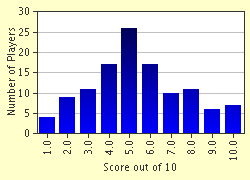Quiz Answer Key and Fun Facts
1. In which work does Tacitus describe Britannia?
2. Tacitus admires the physical and moral strength of the Germanic people. True or false?
3. In which work does Tacitus describe the period from Nero's death to the end of the Flavian dynasty?
4. In which work does Seneca describe the madness of Hercules?
5. Which Roman poet was in love with a woman he called Lesbia?
6. Was Virgil born in Rome?
7. Was Cato the Younger the author of a treatise on agricultural methods and country life?
8. Who was the most important Roman historian in the late 1st century BC and early 1st century AD?
9. Name the most important Roman writers of comedies.
10. Persius was a Roman satirical poet.
Source: Author
maria36
This quiz was reviewed by FunTrivia editor
bullymom before going online.
Any errors found in FunTrivia content are routinely corrected through our feedback system.


